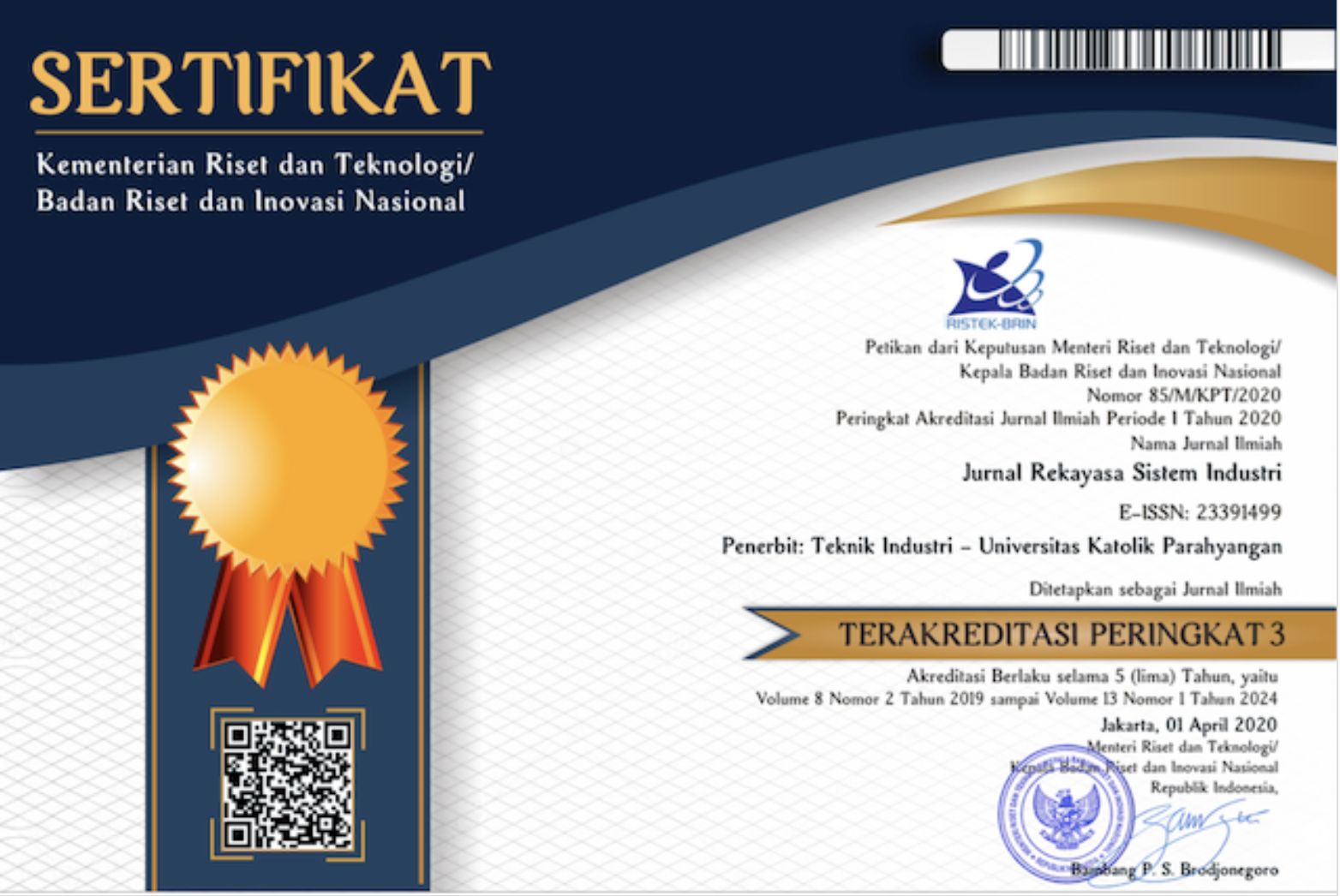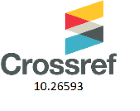Pengukuran Kinerja Rantai Pasok Dengan Model Supply Chain Operations Reference (SCOR) dan Metode Perbandingan Berpasangan
DOI:
https://doi.org/10.26593/jrsi.v7i2.3033.119-125Abstrak
The rapid development of the industrial world has resulted in increasingly tight competition among companies. This condition shows the importance of improving performance, not only in a company but also other parties in the related supply chain, in order to compete with other companies or supply chains. The good performance of a supply chain will certainly increase the customers satisfaction. Therefore, performance measurement needs to be carried out so that a supply chain can find out how well it currently performing is and keep improving it. This study will discuss about the application of the supply chain operations reference (SCOR) model and the pairwise comparison method for the supply chain performance measurement of a product packaging company
Keywords: supply chain, performance measurement, SCOR, pairwise comparison
Referensi
APICS, Supply Chain Operations Reference (SCOR) Framework, [Online], Diakses dari http://www.apics.org/apics-for-business/ frameworks/scor/ [2018, 30 September].
Barnad, J. H. (2006). A Multi-view Framework for Defining the Services Supply Chain Using Object Oriented Methodology. Ph.D. Thesis, University of Central Florida, USA.
Chopra, S. & Meindl, P. (2007). Supply Chain Management: Strategy, Planning, & Operations (3rd ed.). New Jersey: Pearson Prentice Hall.
Giannakis, M. (2011). Management of Service Supply Chains with A Service-oriented Reference Model: The Case of Management Consulting. Supply Chain Management: An International Journal, Vol. 16(5), 346-361.
Hwang, G., Han, S., Jun, S., & Park, J. (2014). Operational Performance Metrics in Manufacturing Process: Based on SCOR Model and RFID Technology. International Journal of Innovation, Management, and Technology, Vol. 5(1), 50-55.
Kasi, V. (2005). Systemic Assessment of SCOR for Modeling Supply Chains. Proceedings of the 38th Hawaii International Conference of System Sciences, Big Island, Hawaii, 1-10.
Lestari, F., Ismail K., Hamid A. A., Supriyanto, E., Yanti, N., & Sutopo, W. (2014). Supply Chain Configuration Using Hybrid SCOR Model and Discrete Event Simulation. Proceedings of the World Congress on Engineering, London, UK, 967-972.
Millet, P. A., Phillip, S., & Valerie, B. G. (2009). The SCOR Model for the Allignment of Business Processes and Information Systems. Enterprise Information Systems, Vol. 3(4), 393-407.
Persson, F., Bengtsson, J., & Gustad, O. (2009). Construction Logistics Improvement Using the SCOR Model – Tornet Case. Proceedings of International Conference on Advances in Production Management Systems, Bordeaux, France, 211-218.
Pujawan, I. N. & Mahendrawathi, E. R. (2010). Supply Chain Management (2nd ed.). Surabaya: Guna Widya.
Saaty, T. L. (1993). Decision Making for Leader: The Analytical Hierarchy Process for Decision in Complex World. Pittsburgh: Prentice Hall.
Seifbarghy, M., Akbari, M. R., & Sajadieh, M. S. (2010). Analyzing the Supply Chain Using SCOR Model in A Steel Producing Company. Proceedings of the 40th International Conference on Computers & Industrial Engineering, Awaji Island, Japan, 1-6.
Sellitto, M. A., Pereira, G. M., Borchardt, M., Da Silva, R. I., & Viegas, C. V. (2015). A SCOR-based Model for Supply Chain Performance Measurement: Application in the Footwear Industry. International Journal of Production Research, Vol. 53(16), 4917-4926.
Trienekens, J. H. & Hvolby, H. H. (2000). Performance Measurement and Improvement in Supply Chains. Proceedings of the 3rd CINet Conference: CI2000 From Improvement to Innovation, 399-408.
Weyers, M. (2017). An Application of the Supply Chain Operations Reference Model for the Service Supply Chain for Standardised Back Office Services. Ph.D. Thesis, Stellenbosch University, South Africa.
Yan, J., Li, K., & Qiu, D. (2007). A SCOR-based Method for Supply Chain Process Reengineering with Applications in Chinese Automotive Industry. Proceedings of the 13th Americas Conference on Information Systems, 226.
Zhou, H., Benton Jr., W. C., Schilling, D. A., & Milligan, G. W. (2011). Supply Chain Integration and the SCOR Model. Journal of Business Logistics, Vol. 32(4), 332-344.













